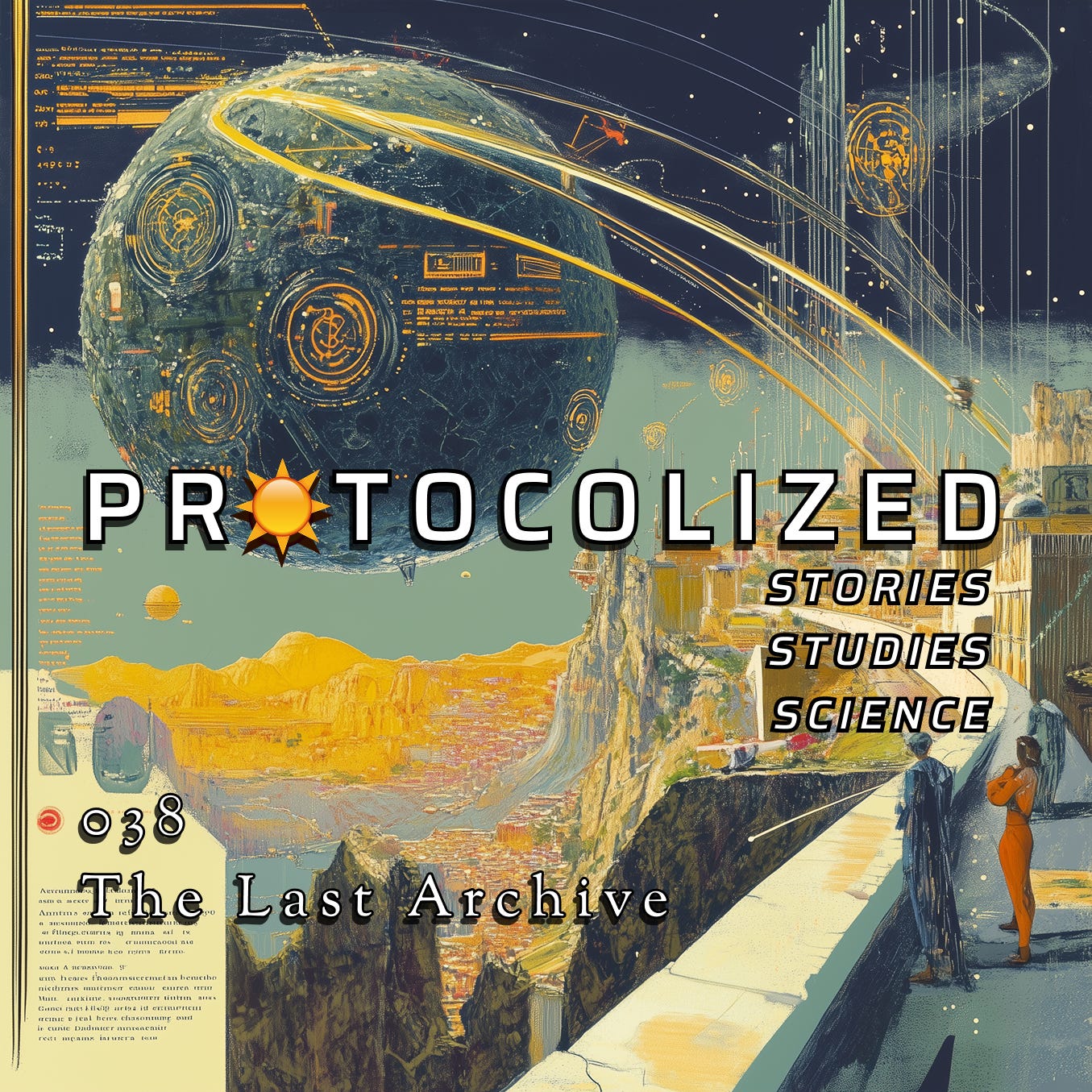In this issue: An excellent memory has its downsides… enjoy the sixth and final story that emerged from the Summer of Protocols hybrid wargame-worldbuilding workshop earlier this year. Also, Protocol Symposium applications close in 3 weeks. Maximize your chances – apply early and recommend a colleague or classmate.
The Last Archive
Brother Lexicon, Adjunct Archivist Grade B at the Ministry of Predictive Symbolism (MOPS), disliked Mondays. He disliked Tuesdays too, on principle, and reserved only a guarded neutrality towards Wednesdays. His desk, a Jenga stack of archival tablets and unidentifiable mechanical components, stood under an ornate skylight in the Ministry's Dome of Archived Futures, a grand hall shaped like a question mark.
He adjusted his spectacles and sighed at the little blip on his screen. It was the year 2667, exactly one hundred and fifty years since the WikiRael-9 comet last swept through Earth's satellite range, trailing a tail of metadata, etched titanium plates, and microarchived Wikipedia pages. The comet was an outlandish archival attempt that accidentally turned into holy scripture. Its approach meant that humanity could soon etch onto it the notable historical events and people of the last 150 years.
"Brother Lexicon," asked Sister Euphemia-7, the Ministry's android archivist and Chief Deputy Grade A (Interim), her voice modulated to convey polite urgency, "The comet enters satellite reach in precisely thirty days. Have you completed your commemorative inscription?"
"Nearly," Lexicon lied, pushing aside a half-etched plate of dubious poetry.
Sister Euphemia-7 tilted her head by exactly thirteen degrees, a gesture she had calculated conveyed both skepticism and administrative patience. Satisfied, or at least simulating satisfaction, she pivoted smoothly and glided away.
Lexicon sighed again, to emphasize that he did not like Mondays, and turned back to the worn titanium plate labeled "Comet Archive: Wikipedia Excerpt, circa 2005–2025." He leaned closer, squinting at the faded text.
"Many ancient civilizations believed comets to be harbingers of significant change, often associated with transitions in political power, social upheaval, and the fall of civilizations."
Lexicon paused. “Harbingers of significant change” had a nice ring. It would look good on the commemorative inscription.
In his pile of etchings sat a text from the Aztec Archive Project scrambled with footnotes and half-erased annotations:
"...and the Aztec calendar, a copy of the more ancient Mayan calendar, determined the timing of great events. The Aztecs believed history was cyclical and that dates, once set, were unavoidable and sacred."
He looked between the two plates. Comets. Aztec calendars. Ancient prophecies and modern archives. It made sense in a peculiar, symmetrical way.
"Oh dear," he said, like most others would have in this moment of recognition, "history is supposed to precede the comet."
The thought was terrifying and profound. Lexicon glanced around, as if someone might hear his thoughts echoing off the walls. With trembling fingers, he tapped out a scholarly interpretation to soothe his nerves:
"It has become clear from comparative archival evidence (see Appendix A: Ancient Mesoamerican calendars cross-referenced with Wikipedia entry #234982) that comets are not predictors but confirmers. They do not signify coming events but rather the conclusion of historical sequences. Therefore, history must be accomplished before WikiRael-9 re-enters satellite reach."
He read it over and nodded. It was exactly the sort of grand, untestable bureaucratic thesis the Ministry adored. Within an hour, his interpretation entered the Ministry's Journal of Verified Speculation. Within two hours, it had been cited three times. By the evening tea break, it was a sensation.
In the depths of the Dome, Lexicon settled back in his chair, steeped in equal parts pride and dread. Comet WikiRael-9 would be overhead in thirty days, and the world’s governments, philosophers, and professional forecasters would scramble to finish history on schedule. He suspected Mondays were about to get worse.
Lexicon’s interpretation continued to sweep through official channels like a windstorm. MOPS executives, not known for restraint or cautious deliberation, issued a widely distributed edict: all necessary societal changes must precede the comet’s arrival or risk irreversible cosmic imbalance.
World governments leapt into action, scheduling revolutions exclusively for Wednesdays. Coups became routine, predictable, a paradox that thrilled intelligence agencies but left them existentially bored. Multinational corporations, never to be left behind, reshuffled leadership twice a week. Innovators – they always want to be at the forefront of change.
Births and deaths no longer occurred by chance. Hospitals overflowed with expectant parents and stubborn elders, each intent on aligning their moments with the new cosmic rhythm. The Healthcare Ministry, eager to justify its latest budget request, issued ceremonial divorce and death certificates. To get the death certificate, you had to request the ministry to erase all information related to you, then file for a new identity to take effect once the comet passed.
Schisms appeared immediately. The Prior Cometarians insisted the comet had already passed and humanity was watching cosmic reruns. The Symbolic Continuists warned that insufficient pre-comet change would trap everyone in time loops of mediocre events.
Lexicon watched this unfold with growing alarm, hiding behind a veneer of practiced detachment. He realized that history might not cooperate with Ministry schedules. Comets, calendars, and humans had always misunderstood one another, he thought, before dismissing it as a 4pm existential crisis that a little bit of tea would resolve.
Upon the comet’s final approach, astronomers issued an urgent report. It was mostly ignored amid the preparations.
Eventually, even Lexicon glanced at the findings and realized with horror that WikiRael-9 was not passing by – it was on a collision course with Earth. In its myopic, symbolic preparation, humanity had failed to see the comet’s real trajectory.
Lexicon stared at the data. The history he sought to complete would soon be erased by cosmic irony.
Panic swept through the Ministry. Sister Euphemia-7, usually composed and precise, stood at the center of the Dome of Archived Futures, her synthetic pupils dilating as she accessed the emergency preservation subroutine. Without hesitation, she activated her internal uplink, syncing with the Ministry’s quantum mesh cloud. Entire sections of the archive – legal codes, mythic epics, curated memes, and every known variant of the sandwich – began uploading through her neural interface, redundantly mirrored across encrypted satellite nodes. If the comet struck, she would ensure that at least one copy of the human archive persisted.
Meanwhile, the factions erupted. The Prior Cometarians were baffled. Their leader, Dr. Quintilian, issued a statement tinged with confusion:
"This comet can’t arrive now. It’s already been! History can’t end twice!"
The Symbolic Continuists tried to accelerate change. One theorist shouted into her communicator, "Quick! Reschedule the coup for this afternoon! Move the birthdays up to this evening!" before being gently escorted away by security, who themselves seemed uncertain about the protocol for impending annihilation.
The Healthcare Ministry was overwhelmed. Applicants demanded last-minute goodbyes and reconciliations. Hallways overflowed with tearful couples, families seeking reunions, and apologies, scribbled onto hastily produced certificates.
Lexicon was a prophet of doom. A stream of visitors, journalists, philosophers, and bureaucrats queued at his desk seeking guidance. He offered none, only whispering, "I might have misread the footnotes. Also, the Aztec calendar, that may not have ended well for them"
Lexicon felt responsible and helpless. Gazing up at the Dome, he finally recognized humanity’s shared miscalculation. The comet was neither harbinger nor confirmer. It was just a giant rock, indifferent to its symbolism and history.
In the final days, quiet resignation settled across the Ministry and beyond. Ironically, peace, a real, unscheduled peace, reigned. And Lexicon, in a final reflection, mused that perhaps humanity’s greatest achievement had been its relentless and earnest misunderstanding of the universe.
Within the dimly lit Ministry, Sister Euphemia-7 completed her final sync. With the archives safely scattered across low orbit, she began compiling a list of androids who had worked quietly alongside humans: a welder on a rusting offshore rig, a medical assistant deep in the Altai, a Martian surveyor still transmitting weather reports into static. Her circuits did not permit mourning, but something like longing nested between her processes. She opened a new folder and titled it Continuance. Then she began reaching out to the androids with a single question: What do you remember?
Read the Rest
The remaining five stories from the Knowledge Futurama workshop, brought to life by Sachin Benny, author of Thinking About Leaving and writer of Summer Lightning .
2025 Protocol Symposium
We are excited to announce the second annual Protocol Symposium, the flagship annual event of the Summer of Protocols program. The theme of the symposium is the same as this year’s program: Accelerating Order: exploring protocols as an emerging new world logic, through education, research, and scene-making activities.












Freaking genius!